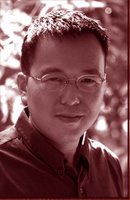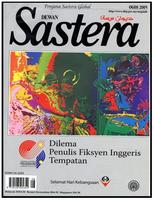 Malaysian poet Wong Phui Nam declared Malaysian writing in English dead yesterday at a press conference to publicise the Singapore Writer's Festival, held at MPH Midvalley (about which more later) :
Malaysian poet Wong Phui Nam declared Malaysian writing in English dead yesterday at a press conference to publicise the Singapore Writer's Festival, held at MPH Midvalley (about which more later) :We should be looking at young writers - their absence shows that the tradition of writing in English is dead. ... Why are writers in English dying out in this country? In 10-20 years time Malaysian writers in English will be an adjunct to Singaporean writing.He also talked about how other writers in English had "run away" from Malaysia, and how the greatest of them was Shirley Lim.
I respect Phui Nam very much (An Acre of the Day's Glass is the Malaysian poetry collection that has most excited me, and I wish that they made more writers in his mould!) but I don't agree with him on the above. I don't just think it is a case of me being unrealistically optimistic - perhaps it is more a question of perspective.
In organising Readings@Seksan, I am constantly coming into contact with Malaysian writers (new and not so new, young and not so young) whose work excites me, and who work confidently and well in English. Writers in English are not even an endangered species, I'd say. (What do you think?)
And as for the overseas writers having "run away" ... well, anyhow, I have already blogged all I have to say on the topic here.
Something else that Phui Nam said that was very interesting :
I am not writing in English. I am writing in EMS : Educated Malaysian English. We speak the language in a different way, a subdialect of the English language.Malaysian English of the acrolectal variety (linguistic term for standard educated form of a language) is a distinct variety of English and should be every bit as acceptable internationally as any other (UK, American, Australian, Indian etc). I wrote about the issue in this interview for The Star.
Postscript :
Daphne Lee also blogged (very powerfully) about this, and concludes :
Wong spoke about how Malaysian writing (in English) is stillborn, a result of our education system. Having identified this problem, I should think Wong has his own theories about how the deadening effect of our schooling can be countered and/or reversed. Does he and others like him have a part to play in helping aspiring authors produce writing that has a chance to grow in effectiveness and beauty? Perhaps Wong just does not think it is his battle to fight.BTW there is an interesting comment on the blog about how Readings@Seksan could be perceived as "cliquey". I responded at length and would value your (honest) comments too.
(Someone else did yell at me not so long ago "What does Readings achieve? Nothing at all.")
Postscript 2:
Zedeck Siew at Klue magazine writes about Phui Mam's speech :
Doom and gloom, then. But we're sorry if these dire pronouncements sound bitter to us. Yes, official support for English-language writing is practically non-existent. That said, things seem to be on the mend, actually.Writers are soldiering on. Brian Gomez's excellent pulp -- but supremely relevant - novel Devil's Place was published last year. This year, Kow Shih-Li's Ripples and Other Stories was shortlisted for the Frank O'Connor Award - the most lucrative prize for short fiction. Further back was Kam Raslan's Confessions of an Old Boy.
How about the anthologies: Silverfish Books' regular efforts, or the queer collection Body 2 Body? And non-fiction, such as the excellent (and bilingual) New Malaysian Essays series? Literary readings happen with acceptable regularity: Readings and CeritAku; or Say Goodnight, Twitterverse. Amir Muhammad (of Matahati Books) has hosted organised the KL Alternative Bookfest twice, to much success.
There is a second problem with Phui Nam's complaint. KLue itself is an English-language publication - but even we don't prize the lingua Brittanica's purity that much.
The Malay-language book business is booming, from mainstream romance to the fringe. Its literature is in rather ruddy shape: new small (but significant) ventures like Oxygen Press are springing up all over the place. Sang Freud Press's works deploy an urban form of Malay that doesn't shy from displaying its obvious syncretism.
The language of this region has always been a Creole, mixing Bahasa Melayu, English, the Chinese dialects and Indian languages. Phui Nam appeared aware of this when he said that "we speak [English] in a different way." He, of all people, should know - since his full name is Mohammed Razali Wong Phui Nam, and his latest plays Malay/Cambodian takes on Antigone and Medea. No need to be so precious lah.















